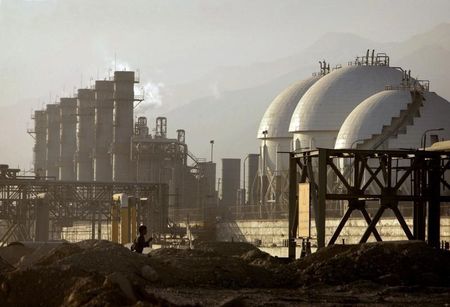Investing.com– Oil prices retreated Tuesday, falling from six-month highs on speculation that an response from Israel to an Iranian attack would be measured.
AT 08:45 ET (12:45 GMT), Brent oil futures fell 0.3% to $85.14 a barrel, while West Texas Intermediate crude futures dropped 0.4% to $89.76 a barrel .
Uncertainty in the Middle East
Geopolitical tensions in the Middle East ramped up over the weekend after Iran launched a large-scale drone and missile strike against Israel.
Speculation of such an attack had driven oil prices to their highest levels since October on Friday, amid fears such a move could lead to all-out war in the Middle East, dragging in countries like the U.S..
Tensions between Iran and Israel have been a key point of support for oil prices, as traders bet that a widespread conflict in the Middle East will disrupt supply from the oil-rich region.
Iran in particular is a member of the Organization of Petroleum Exporting Countries, and is a key producer in the Middle East.
However, prices fell on Monday, and have continued to drift lower, after Iran’s attack on Israel proved to be less damaging than anticipated, easing concerns of a quickly intensifying conflict that could disrupt supply.
“The key for markets will now be the extent of the retaliation. Should Israel follow up with similarly ambitious missile attacks or, under a worse-case scenario, other nations become embroiled in the conflict, notably the US, then we would likely see a flight to safety in markets, whereby investors flock to the safe-havens at the expense of high-risk assets,according to Matthew Ryan, Head of Market Strategy at global financial services firm Ebury.
“The threat to global oil supply would also likely trigger a sharp move upwards in oil prices, which could comfortably jump above $100 a barrel should investors fear a wider regional war.”
Additionally, the Iran’s attack on Israel is unlikely to prompt dramatic sanctions action on the Persian country’s oil exports from the Biden administration due to worries about boosting oil prices and angering top buyer China.
The political pressure to punish Iran creates a thorny problem for the Biden administration: how to deter such attacks in future without escalating regional tensions, raising oil prices or antagonizing China, the biggest buyer of Iranian oil.
Washington has said for months that among its primary goals is to keep the Gaza conflict between Palestinian group Hamas and Israel from metastasizing in to a wider regional war, with a key aim of keeping Tehran on the sidelines.
Chinese growth offers limited support
Beyond the tensions in the Middle East, the crude markets received tentative support from stronger-than-expected first-quarter gross domestic product data from China.
Data released earlier Tuesday showed that Chinese GDP rose 5.3% year-on-year in the first three months of the year, above expectations of 4.8% growth and improved from the 5.2% print seen in the prior quarter.
However, the news was mixed as other data released around the same time, i.e. industrial production and retail sales, painted a weaker picture, as the world’s second-largest economy has struggled to mount a strong and sustainable post-COVID bounce, burdened, in particular, by a protracted property downturn.
Data on U.S. crude inventories, from the American Petroleum Institute, later in the session will be studied carefully, after last week’s data from the industry body showed that crude stockpiles rose more than expected.
(Ambar Warrick contributed to this article.)
